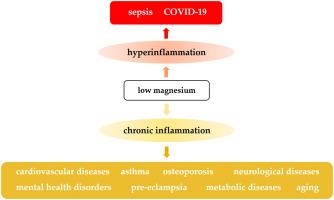Seminars in Cell & Developmental Biology ( IF 7.3 ) Pub Date : 2020-11-18 , DOI: 10.1016/j.semcdb.2020.11.002 Jeanette A Maier 1 , Sara Castiglioni 1 , Laura Locatelli 1 , Monica Zocchi 1 , André Mazur 2

|
Magnesium is an essential element of life, involved in the regulation of metabolism and homeostasis of all the tissues. It also regulates immunological functions, acting on the cells of innate and adaptive immune systems. Magnesium deficiency primes phagocytes, enhances granulocyte oxidative burst, activates endothelial cells and increases the levels of cytokines, thus promoting inflammation. Consequently, a low magnesium status, which is often underdiagnosed, potentiates the reactivity to various immune challenges and is implicated in the pathophysiology of many common chronic diseases. Here we summarize recent advances supporting the link between magnesium deficiency, inflammatory responses and diseases, and offer new hints towards a better understanding of the underlying mechanisms.
中文翻译:

镁与炎症:进展与展望
镁是生命的必需元素,参与调节所有组织的新陈代谢和体内平衡。它还调节免疫功能,作用于先天性和适应性免疫系统的细胞。镁缺乏会激活吞噬细胞,增强粒细胞氧化爆发,激活内皮细胞并增加细胞因子的水平,从而促进炎症。因此,通常未被诊断出的低镁状态会增强对各种免疫挑战的反应性,并与许多常见慢性病的病理生理学有关。在这里,我们总结了支持镁缺乏、炎症反应和疾病之间联系的最新进展,并为更好地理解潜在机制提供了新的线索。



























 京公网安备 11010802027423号
京公网安备 11010802027423号